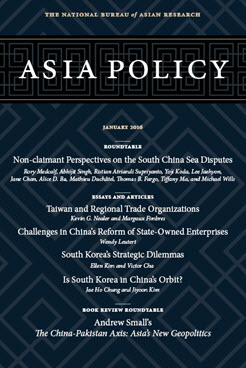Singapore and the South China Sea
Being an Effective Coordinator and Honest Broker
This essay is part of the roundtable “Non-claimant Perspectives on the South China Sea Disputes.”
The South China Sea has long been a source of regional tension, and disputes have heated up significantly in recent years. Disagreements over competing territorial sovereignty and maritime claims between Brunei, China, Malaysia, the Philippines, Taiwan, and Vietnam are the main source of this tension. Singapore, as a non-claimant country to the South China Sea disputes, does not take sides nor judge the merits of the rival claims. It has consistently urged “all parties to manage their differences calmly and peacefully in accordance with international law, including UNCLOS [United Nations Convention on the Law of the Sea].” [1]
Not being a claimant does not mean that Singapore has no interest in the South China Sea. Much to the contrary, as a small state, it has an interest in ensuring that all claimant states always act in accordance with international law, including UNCLOS. [2] Moreover, as an island state, Singapore has an interest in ensuring that international law preserves freedom of navigation and overflights and that such law is interpreted and applied consistently. Finally, as a Southeast Asian state, Singapore has an interest in ensuring that the Association of Southeast Asian Nations (ASEAN) remains cohesive and united and that its processes effectively advance common interests by engendering a high degree of cooperation and integration among all member states. However, little progress has been made in negotiating a binding code of conduct (CoC) in the South China Sea since the adoption of the 2002 Declaration on the Conduct of Parties in the South China Sea (DoC). Singapore, as the current country coordinator for ASEAN-China dialogue relations, hopes to make progress on that front.
This essay examines Singapore’s interests and role in the South China Sea in four areas: the commitment to upholding the rule of law in the relations between states, the defense of the right to freedom of navigation and overflight, the attention Singapore gives to ASEAN and the role of multilateralism in the region, and its current role as country coordinator of ASEAN-China dialogue relations.
Rule of Law
Singapore consistently has advocated for all parties to manage their differences calmly and peacefully in accordance with international law, including the 1982 UNCLOS. As a small country, Singapore has a fundamental interest in the peaceful settlement of international disputes in accordance with international law and its sanctioned processes rather than on the basis that might is right. [3] Sovereignty disputes are governed by customary international law on the acquisition and loss of territory, not by the 1982 UNCLOS—a rather common misperception. Having presided over negotiations of the 1982 UNCLOS, Tommy Koh has iterated on various occasions that “UNCLOS contains no provisions on how to resolve sovereignty disputes over islands or other geographic features.” [4] The convention does set the various maritime zones that such features could potentially generate, defines the rights and obligations in those maritime zones, and in the event that there are overlapping maritime claims, determines how the maritime boundaries can be delimited in accordance with international law. Alas, claimant states in the South China Sea have taken unilateral actions in disputed areas, such as reclaiming and building artificial islands, conducting oil and gas exploration and exploitation, and increasing military and enforcement presence, all worrying trends.
At this stage, where disputes are unlikely to be resolved by negotiation, Singapore advocates reliance on rules-based regimes and mechanisms to ensure peaceful settlement of the matter. Under no circumstances should force or the threat of force be used to settle disputes among states. Practical recommendations for managing the current level of tensions include a sweeping halt to all unilateral actions contrary to international law and…
Endnotes
[1] Ministry of Foreign Affairs (Singapore), “MFA Press Statement: Introductory Calls on Minister for Foreign Affairs Minister Dr. Vivian Balakrishnan,” Press Release, October 28, 2015.
[2] S. Jayakumar (keynote address at the Centre for International Law’s Conference on Joint Development and the South China Sea, Singapore, June 16, 2011).
[3] S. Jayakumar, Diplomacy: A Singapore Experience (Singapore: Straits Times Press, 2011), 198; and Lee Hsien Loong, “China and the World—Prospering and Progressing Together” (speech presented at the Central Party School, Beijing, September 6, 2012), http://www.mfa.gov.sg/content/mfa/overseasmission/beijing/press_statements_speeches/2012/201209/Press_20120906.html. Also see S. Jayakumar and Tommy Koh, Pedra Branca: The Road to the World Court (Singapore: National University of Singapore Press, 2008), xiii.
[4] Tommy Koh is ambassador-at-large at the Singapore Ministry of Foreign Affairs, chairman of the Centre for International Law, and a professor at the National University of Singapore. Professor Koh was the president of the Third United Nations Conference on the Law of the Sea.
Jane Chan is a Research Fellow and the Coordinator of the Maritime Security Programme at the Institute of Defence and Strategic Studies in the S. Rajaratnam School of International Studies at Nanyang Technological University.
About Asia Policy
Asia Policy is a peer-reviewed scholarly journal presenting policy-relevant academic research on the Asia-Pacific that draws clear and concise conclusions useful to today’s policymakers. Asia Policy is published quarterly in January, April, July, and October and accepts submissions on a rolling basis. Learn more


